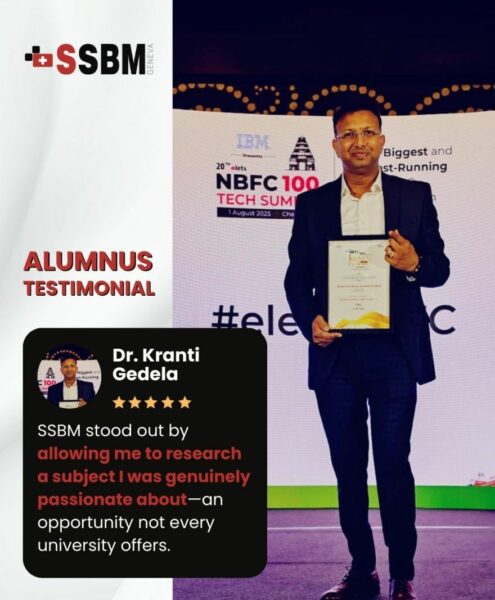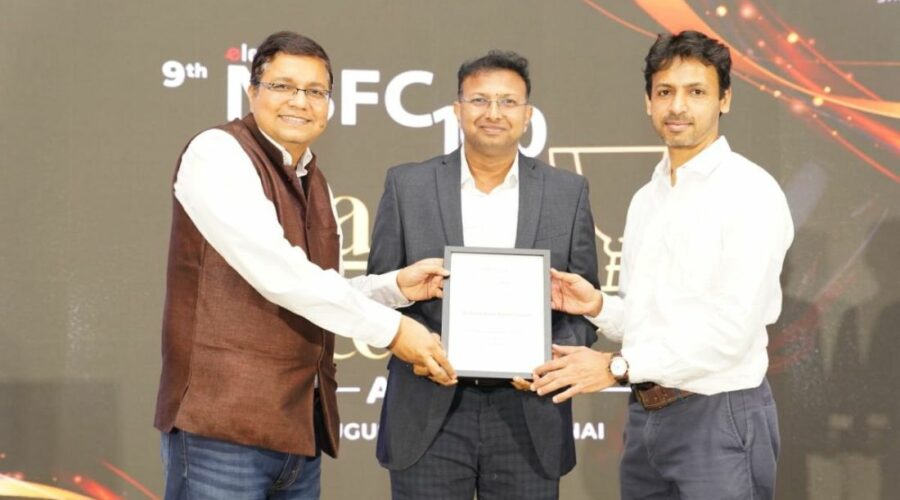We use cookies to enhance your browsing experience, serve personalized ads or content, and analyze our traffic. By clicking "Accept", you consent to our use of cookies. Read More

SSBM proudly congratulates our esteemed alumnus, Dr. Kranti Gedela, on being honored with the Visionary Leader Award at the prestigious Elets – Leader of Excellence Awards, held during the Tech Summit presented by IBM on 1st August 2025.
This recognition is a testament not only to Dr. Gedela’s outstanding contributions to the field of IT Service Management, but also to the impact of his doctoral research: “Bridging Traditional ITSM with Modern Engineering – An Ethnographic Study of ITIL and SRE on GCP.” His work has resonated across both academic and industry circles, exemplifying the spirit of innovation and excellence we foster at SSBM.
I have always had a desire to do something extraordinary in the field of IT Service Management. The increasing need to amalgamate modern engineering principles with ITIL—especially in environments where the Agile manifesto is key—drove me to explore this intersection. SSBM provided the perfect platform to pursue this vision.
SSBM stood out by allowing me to research a subject I was genuinely passionate about—an opportunity not every university offers. I was fortunate to be mentored by an extraordinary guide, Dr.Sagar Bansal, who constantly ensured I stayed on track and motivated. His dedication and encouragement were instrumental in helping me complete my work on time, and I remain profoundly grateful to him.
Over the years, I’ve supported more than 3,000 IT professionals—whether through training, mentoring, or helping them resolve complex queries during their certification journeys. While this has been a long-standing commitment, it’s my recent doctoral research in IT Service Management (ITSM) that truly set the stage for receiving the Visionary Leader Award.
My research, titled “Bridging Traditional ITSM with Modern Engineering – An Ethnographic Study of ITIL and SRE on GCP,” is the first of its kind globally. It addresses a critical gap in the field by integrating traditional ITSM frameworks with modern site reliability engineering practices. This pioneering work not only advances academic understanding but also drives practical innovation across the industry.

I’m proud to have been the first to integrate ITIL and SRE within the Google Cloud Platform. This pioneering work has elevated my professional identity—today, I’m recognized as Dr. Kranti, not just Mr. Kranti. My research has been well received by senior leadership within my organization and has become a reference point for many teams. It’s fulfilling to see my work appreciated and adopted across the board.
My research explores how large-scale organizations using ITIL can effectively collaborate with vendors and partners, leveraging Google’s SRE. Through case studies, I examined the synergy between formal process management and automation-driven reliability practices. Key challenges included resource allocation, cultural misalignment, and tooling complexities. The study highlights the strategic importance of bridging ITIL’s governance with SRE’s adaptive engineering mindset to enhance service resilience, reduce downtime, and accelerate innovation. I introduced practical frameworks for incident management, communication protocols, and continual improvement, emphasizing metrics like SLAs, SLOs, and error budgets. Ultimately, the research offers a roadmap for hybrid operational models that align business-critical IT processes with next-gen reliability engineering.
At first, completing a dissertation may seem daunting. My advice is to start small—write for just 10 minutes a day—and maintain regular dialogue with your mentor. You’ll be surprised at the progress you make. Be prepared to pivot and revise your work, especially before your defense, to meet evolving standards. It may be challenging, but the reward of having “Dr.” before your name is truly worth it.